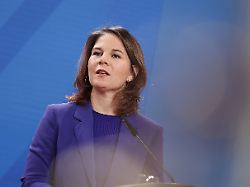Feminist Foreign Policy
Baerbock presents catalog of guidelines
02/28/2023, 12:11 am
When the traffic light parties negotiate their coalition agreement in November 2021, the term feminist foreign policy also appears. It aims to strengthen the rights, resources and representation of women and girls worldwide. In an 80-page catalogue, the Foreign Ministry now explains how this is to be done in concrete terms.
Foreign Minister Annalena Baerbock wants to establish feminist foreign policy as a working principle in the Federal Foreign Office with her own ambassador and an 80-page catalog of guidelines. “We are pursuing a feminist foreign policy because it is sorely needed. Because men and women worldwide are still not equal,” writes the Green politician in the foreword to the final version of the guidelines. Baerbock wants to present the concept together with Development Minister Svenja Schulze after the cabinet meeting today.
“Women’s rights are an indicator of the state of our societies,” writes Baerbock. A feminist foreign policy aims to achieve equality for women and girls worldwide. The concept is “not foreign policy for women, but for all members of a society”. The guidelines would “run through our actions as a team at the Federal Foreign Office in terms of mainstreaming, in our national foreign policy, in the European Union and in international forums”. The guidelines should “shape our inner working methods and help us to develop a “feminist reflex”.
In order to implement feminist foreign policy, Baerbock wants to develop new working methods and structures in the Federal Foreign Office, in which “mainstreaming” – “should play a key role”. To this end, the minister wants to create the post of “Ambassador of the Federal Foreign Office for Feminist Foreign Policy”. “We will work hard to give our foreign service a more feminine face and increase the proportion of women in managerial positions,” announced Baerbock.
According to Baerbock, the goal is to spend 85 percent of the project funds “gender-sensitively” by the end of the legislative period, so that women’s concerns are included. Eight percent of the funds should be paid “gender-transformative”, so that there is an active redesign of the projects in this direction. The six guidelines for future foreign policy action state, among other things, that “we integrate the perspectives of women and marginalized groups into our global work for peace and security”. The news portal “The Pioneer” quotes from the guideline, which deals with climate and energy foreign policy. It says: “Women and various social groups are important actors and leaders in our climate and energy diplomacy. We help to balance the specific effects of the climate crisis on women and marginalized groups.”
